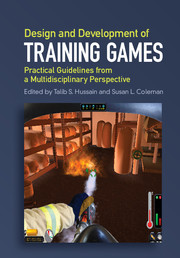Book contents
- Frontmatter
- Dedication
- Contents
- Contributors
- Acknowledgments
- Introduction
- Chapter 1 Learning Game Disciplines
- Chapter 2 Communication for Stronger Learning Game Design
- Chapter 3 Instructional and Gaming Elements
- Chapter 4 Story for Learning and Gaming
- Chapter 5 Authenticity in Learning Games
- Chapter 6 Design Better Games
- Chapter 7 Bridging the Gap from Design to Implementation
- Chapter 8 Integrating Games into Learning Environments
- Chapter 9 Multidisciplinary Learning Game Development Method
- Chapter 10 Game Review Criteria
- Chapter 11 Game Review
- Chapter 12 Development Methods
- Chapter 13 Game Review
- Chapter 14 Development Methods
- Chapter 15 Game Review
- Chapter 16 Development Methods
- Chapter 17 Game Review
- Chapter 18 Development Methods
- Chapter 19 Game Review
- Chapter 20 Development Methods
- Chapter 21 Game Review
- Chapter 22 Development Methods
- Chapter 23 Game Review
- Chapter 24 Development Methods
- Index
- References
Chapter 10 - Game Review Criteria
Published online by Cambridge University Press: 05 May 2015
- Frontmatter
- Dedication
- Contents
- Contributors
- Acknowledgments
- Introduction
- Chapter 1 Learning Game Disciplines
- Chapter 2 Communication for Stronger Learning Game Design
- Chapter 3 Instructional and Gaming Elements
- Chapter 4 Story for Learning and Gaming
- Chapter 5 Authenticity in Learning Games
- Chapter 6 Design Better Games
- Chapter 7 Bridging the Gap from Design to Implementation
- Chapter 8 Integrating Games into Learning Environments
- Chapter 9 Multidisciplinary Learning Game Development Method
- Chapter 10 Game Review Criteria
- Chapter 11 Game Review
- Chapter 12 Development Methods
- Chapter 13 Game Review
- Chapter 14 Development Methods
- Chapter 15 Game Review
- Chapter 16 Development Methods
- Chapter 17 Game Review
- Chapter 18 Development Methods
- Chapter 19 Game Review
- Chapter 20 Development Methods
- Chapter 21 Game Review
- Chapter 22 Development Methods
- Chapter 23 Game Review
- Chapter 24 Development Methods
- Index
- References
Summary
Abstract
What should we look for in a game? How well do existing games embody good instructional and gaming design principles? How do we put those design principles into practice? The following chapters will review several games of different genres and domains. For each game, there are two chapters. The first is an impartial review of the game and the second is a description of the methods and lessons learned from the game developer’s perspective. In this chapter, we introduce each game briefly, discuss the criteria used to review the games, and summarize some of the key points you should look for in these and other games.
Introduction
Now that we’ve introduced a number of key issues and approaches to consider when designing a learning game, let’s put it all in context. The following chapters review seven different games, each focused on a different approach to training or a different training use.
- Type
- Chapter
- Information
- Design and Development of Training GamesPractical Guidelines from a Multidisciplinary Perspective, pp. 337 - 346Publisher: Cambridge University PressPrint publication year: 2014



